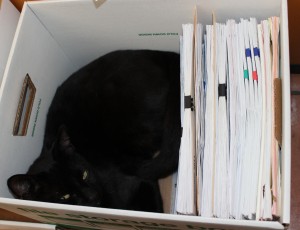Paper multiplies. The piles get bigger. The file drawers get full. And people forget or don’t want to archive their old papers. But archiving paperwork is an important part of the flow of paper. Don’t let the term archive scare you away. Archiving papers is simply relocating papers that you need to keep for legal, tax, or personal reasons but no longer have to keep in the coveted access of your current file system. Tax time is the perfect time to archive since you are already gathering papers for your tax returns and going through your files- or piles.
With an increasing amount of electronic communication, there is less and less physical paperwork, but there still remains some to archive. I leave my hanging files and folders in the drawer. I use binder clips to group together my archive papers and put them in a file box. It is unlikely I will ever need anything I have archived anyway, so I might as well save room and supplies.
Here are some things to consider archiving yearly if you have them in paper format. Last years:
- Tax return paperwork (keep the actual return handy for reference)
- Credit card statements
- Bank statements
- Investment statements
- Utility bills
- Medical Explanation of Benefits and receipts
- Any insurance policies that are outdated, but you are not ready to part with
- Any old files that you still have in your file drawer and never access, but are not ready to part with
How long you archive them for depends on your tax situation, legal requirements, and personal comfort level. Some people toss EOBs as soon as they get them. Other people like to file them away and keep them for a few years. It is whatever makes you comfortable. Just remember to label the archive box contents before storing them. After a few years have passed, you can revisit what still needs to be kept and what can finally be shredded or disposed off.
Now you have a little- or a lot more space in your file drawers for the current year ahead. Happy archiving!

